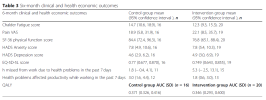
www.bmj.com
20 August 2025
Selina R Shaw
General Practitioner
Nil
Amersham Health Centre, NHS
Amersham Health Centre, Chiltern Avenue, Amersham , HP6 5AY
Nil
Dear Editor,
As a clinician, I read with interest the article “Cognitive and mental health outcomes in Long Covid” and commend the authors for addressing this important topic. However, the article underscores limitations in the field: current research often examines neurocognitive dysfunction in isolation, without considering the systemic metabolo-neuroimmune disorders that drive its pathophysiology.
In clinical practice, patients with Long Covid (LC) frequently present with overlapping syndromes, including post-exertional malaise (PEM—the hallmark of ME/CFS) (1), dysautonomia, and mast cell activation symptoms (2). Cognitive dysfunction in LC fluctuates with exacerbation these conditions and cannot be understood in isolation from them.
PEM warrants recognition as a neurological pathology resulting from metabolic and immune dysregulation (3). Approximately 48 hr after a triggering event—physical, cognitive, or emotional—patients experience what is colloquially termed a “crash.” This involves a surge in neurological symptoms that may render them unable to function: profound fatigue, cognitive slowing, hypersomnia, photophobia, phonophobia, tinnitus, nausea, headaches, migraines, executive dysfunction, word-finding difficulties, working memory impairment, pain, and worsening dysautonomia with orthostatic intolerance, mood disorders. Although these symptoms may be present at baseline, they rapidly escalate in the disabling cacophony of the “crash”. Many patients report diurnal variation, with symptoms peaking midday and easing somewhat towards night, repeating daily until resolution, suggesting a neuroimmune process with a circadian rhythm. Patients often experience disablement until the episode resolves over days or weeks.
After an episode of PEM, patients may return to their prior cognitive baseline (which is often already impaired) or decline to a new, lower baseline, suggesting cumulative neurological injury. Conversely, strict avoidance of PEM—though often impossible when basic activities exceed the trigger threshold—may allow partial neurological recovery. Elevated neurofilament light chain and GFAP in LC, proteins consistent with traumatic brain injury, support the hypothesis of repeated neuroinflammatory damage (4).
Recent work demonstrates that exercise exceeding the aerobic threshold causes skeletal muscle damage and necrosis in LC patients with PEM (3). Since the aerobic threshold is pathologically lowered in this group, even minimal daily movements may induce metabolic tissue damage. Necrosis is a powerful immune stimulus, yet the link between peripheral tissue injury and delayed onset neurological deterioration remains unexplored. Similarly, the unexplained 48 hr lag between exertion and symptom onset invites parallels with type IV hypersensitivity, in which delayed immune responses arise during T-cell recruitment.
Immune-mediated brainstem inflammation has also been observed in post-Covid patients (5). The brainstem houses structures implicated in the symptoms exacerbated during PEM—autonomic control centres, circadian regulators, arousal and alertness networks, cognitive processing hubs, pain modulators, and the locus coeruleus and nucleus of the solitary tract. These nuclei may mediate profound fatigue and malaise in response to systemic inflammation. Thus, a surge in peripheral inflammation from exertion-induced necrosis could be detected by an inflamed brainstem, precipitating an exaggerated sickness response that disables the patient until inflammation partially resolves. Research is urgently needed to test this hypothesis and identify therapeutic targets.
Currently, no intervention can terminate PEM once initiated. No amount of compensatory rest prevents its emergence after a trigger. However, clinicians report that long-term low-dose naltrexone (LDN) can reduce the frequency and severity of PEM in some patients. Its mechanisms—mast cell stabilization, microglial modulation, natural killer cell functional restoration—may yield further insights into PEM pathophysiology (6).
I urge the research community to prioritise cross-disciplinary investigation into cognitive dysfunction and its fluctuating nature in the context of PEM in Long Covid. Such work could transform understanding and inform targeted therapies for the millions worldwide who remain debilitated by this condition.
References
1. An Y, Guo Z, Fan J, Luo T, Xu H, Li H, et al; Prevalence and measurement of post-exertional malaise in post-acute COVID-19 syndrome: A systematic review and meta-analysis. Gen Hosp Psychiatry. 2024 Nov–Dec;91:130-42. doi:10.1016/j.genhosppsych.2024.10.011. Epub 2024 Oct 20.
2. Theoharides TC, Twahir A, Kempuraj D. Mast cells in the autonomic nervous system and potential role in disorders with dysautonomia and neuroinflammation. Ann Allergy Asthma Immunol. 2024 Apr;132(4):440-54. doi:10.1016/j.anai.2023.10.032. Epub 2023 Nov 10.
3. Appelman B, Charlton BT, Goulding RP, Kerkhoff TJ, Breedveld EA, Noort W, et al. Muscle abnormalities worsen after post-exertional malaise in long COVID. Nat Commun. 2024 Jan 4;15(1):17. doi:10.1038/s41467-023-44432-3.
4. Plantone D, Stufano A, Righi D, Locci S, Iavicoli I, Lovreglio P, et al. Serum biomarkers of neuro-axonal and astroglial injury in long COVID. Sci Rep. 2024 Mar 18;14(1):6429. doi:10.1038/s41598-024-57093-z.
5. Rua C, Raman B, Rodgers CT, Newcombe VFJ, Manktelow A, Chatfield DA, et al. Quantitative susceptibility mapping at 7 T in COVID-19: brainstem effects and outcome associations. Brain. 2024 Dec;147(12):4121-30. doi:10.1093/brain/awae215.
6. Sasso EM, Eaton-Fitch N, Smith P, Muraki K, Marshall-Gradisnik S. Low-dose naltrexone restored TRPM3 ion channel function in natural killer cells from long COVID patients. Front Mol Biosci. 2025 May 19;12:1582967. doi:10.3389/fmolb.2025.1582967.
Competing interests: No competing interests



